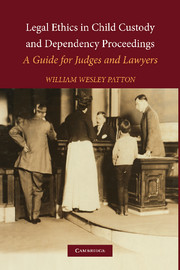Book contents
- Frontmatter
- Contents
- Foreword, by Martin Guggenheim
- Acknowledgments
- Introduction
- 1 Conflicts of Interest
- 2 Competent and Zealous Representation
- 3 Confidentiality
- 4 The Ethics of Alternative Dispute Resolution in Child Custody and Dependency Proceedings
- 5 Ethical Considerations and Constraints in Child Custody and Dependency Appeals
- 6 The Constitutionality of Legislative and Executive Regulation of the Practice of Law and Defining the Attorney-Client Relationship
- Appendix A National Association of Counsel for Children Standards
- Appendix B American Bar Association Standards of Practice for Lawyers Who Represent Children in Abuse and Neglect Cases
- Appendix C In re Car Simulation and Analysis
- Other Authorities
- Cases and Ethics Opinions
- Index
3 - Confidentiality
Published online by Cambridge University Press: 24 July 2009
- Frontmatter
- Contents
- Foreword, by Martin Guggenheim
- Acknowledgments
- Introduction
- 1 Conflicts of Interest
- 2 Competent and Zealous Representation
- 3 Confidentiality
- 4 The Ethics of Alternative Dispute Resolution in Child Custody and Dependency Proceedings
- 5 Ethical Considerations and Constraints in Child Custody and Dependency Appeals
- 6 The Constitutionality of Legislative and Executive Regulation of the Practice of Law and Defining the Attorney-Client Relationship
- Appendix A National Association of Counsel for Children Standards
- Appendix B American Bar Association Standards of Practice for Lawyers Who Represent Children in Abuse and Neglect Cases
- Appendix C In re Car Simulation and Analysis
- Other Authorities
- Cases and Ethics Opinions
- Index
Summary
Attorneys in child custody and child dependency proceedings are much more than mere litigators. One of the central roles in these emotionally charged legal arenas is acting as counselors, not only regarding legal issues but also on nonlegal issues. ABA Model Rule 2.1 provides that client representation includes reference to “other considerations such as moral, economic, social and political factors….” It is thus not surprising that in these disputes, which involve heightened sensitivity, confidentiality is a central concern of the parties. However, because the best interest of children is central to the child custody and juvenile dependency systems, conflicts with the duty of confidentiality often arise in contexts in which that confidential information demonstrates an admission of past child abuse or threats of future abuse.
This chapter discusses the often differing and sometimes conflicting balance between client confidentiality and children's safety. When is a judge permitted to disclose confidential data either to defend the court system or to educate the public, and under what circumstances must or can attorneys disclose confidential client data? Finally, what is the constitutional limit of the court's power to issue contempt citations for violations of confidentiality, and what sanctions are reasonably likely for attorneys who disclose confidential client information that can be both embarrassing and incriminating for parties in concurrent criminal child abuse actions, as, for instance, in Conduct of the Honorable Ronald D?
- Type
- Chapter
- Information
- Legal Ethics in Child Custody and Dependency ProceedingsA Guide for Judges and Lawyers, pp. 68 - 87Publisher: Cambridge University PressPrint publication year: 2006

